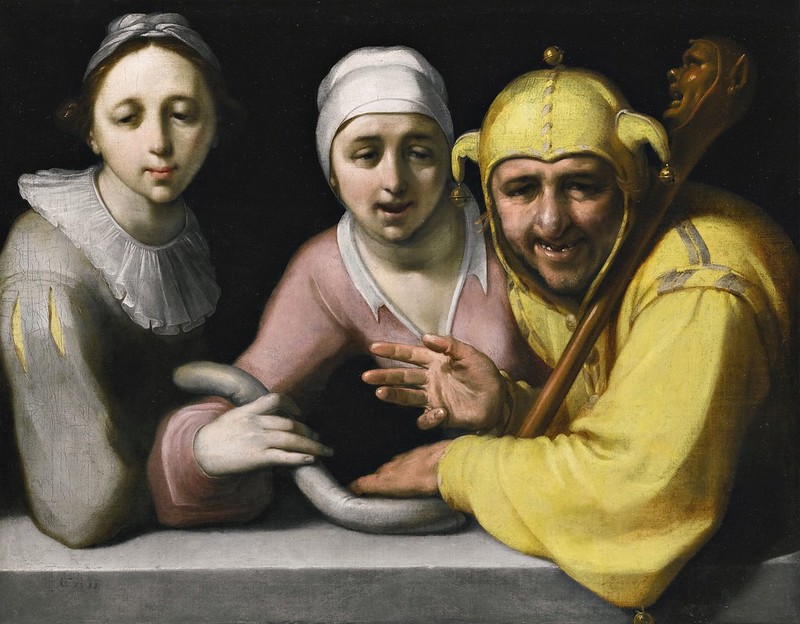Obra de Cornelis van Haarlem (1562-1638), pintor holandès (1)
- Recordatori de Pomponio Nenna -
En el dia de la celebració del seu 459è aniversari de naixement
Parlem de Pintura...
Cornelis Corneliszoon van Haarlem (Haarlem, 1562 - Haarlem, 11 de novembre de 1638) va ser un pintor holandès, un dels més importants de la seva generació i precursor de l'art de Frans Hals. Membre de l'escola Manerista d'Haarlem, es va orientar vers el retrat, la mitologia i la religió, d'entrada amb obres de gran format per anar-les reduint amb el temps. Va viure a Haarlem si bé el 1568, i durant el setge espanyol de la Guerra dels Vuitanta Anys, va quedar sota la tutela del seu mestre Pieter Pietersz el Vell. Va viatjar a França i Bèlgica on es va convertir en un pintor àmpliament reputat, rebent encàrrecs de nobles i membres de la cort. Va tornar a Haarlem on va seguir exercint com a pintor i on va assolir notable fama. Juntament amb altres pintors destacats, va formar l'Acadèmia d'Haarlem coneguda amb el nom dels "Manieristes d'Haarlem". Va treballar com a professor tenint com a alumnes, entre altres, a Cornelis Claesz Heda, germà de Willem Claeszoon Heda. Va morir a Haarlem el novembre de 1638.
Font: En català: Cornelis van Haarlem (1562-1638) - En castellano: Cornelis van Haarlem (1562-1638) - In english: Cornelis van Haarlem (1562-1638) - Altres: Cornelis van Haarlem (1562-1638)
Parlem de Música...
Pomponio Nenna (Bari, bap. 13 de juny de 1556 - Rome?, 25 de juliol de 1608) va ser un compositor italià. Fill de Giovanni Battista Nenna (1508-c.1565), un oficial de la ciutat de Bari, es desconeix la seva formació inicial tot i que es creu que va rebre classes de Stefano Felis, de Giovanni Jacopo de Antiquis, de Giovanni de Marinis i de Rocco Rodio. Va treballar activament a Itàlia com a mestre de madrigals inspirant-se o potser compartint feina amb Carlo Gesualdo. Va viure entre Nàpols i Roma, ciutat aquesta darrera on probablement va morir el juliol de 1608.
OBRA:
Vocal secular:
Il primo libro de [20] madrigali, 5vv (Venice, 1582); ed. in PIISM, Monumenti, ii (1942)
Il quarto libro de [20] madrigali, 5vv (Venice, 2/1609) [1st edn. lost]; ed. in PIISM, Monumenti, ii (1942)
Il quinto libro de’ [20] madrigali, 5vv (Naples, 1603), ed. in Girolamo Frescobaldi Opere Complete, v (Milan, 1996), 102
Il sesto libro de [19] madrigali, 5vv (Naples, 1607) [incl. 2 villanellas]
Il settimo libro de [20] madrigali, 5vv (Naples, 1608)
Il primo libro de [21] madrigali, 4vv (Naples, 1613, inc., repr. 1621 with bc) ed. in Pompilio [incl. 2 previously pubd in Alessandro di Costanzo: Il primo libro de’ madrigali, 4vv, Naples, 1604, 2/1616]
L’ottavo libro de [14] madrigali, 5vv, ed. F. Archilei (Rome, 1618)
Madrigal, 6vv, 1585;
Madrigal, 5vv, S. Felis: Il primo libro de madrigali, 5vv (Venice, 2/1585, lost);
2 madrigals, 5vv, S. Felis: Il quinto libro de madrigali, 5vv (Venice, 1583, lost);
4 villanellas, 3vv, 15745, 15746, ed. in PIISM, Antologie, i (1941);
Ricercare, 2vv, 159019;
Spiritual canzonetta, 2vv, I-BRq, inc.
Vocal religiosa:
Responsorii di Natale e di Settimana Santa, 4vv (Naples, 1607, inc., repr. 16227 with bc)
Sacrae Hebdomadae responsoria, 5vv, bc (Rome, 1622)
Psalm, 4vv, in Salmi delle compieta, ed. M. Magnetta (Naples, 1620)
OBRA:
Vocal secular:
Il primo libro de [20] madrigali, 5vv (Venice, 1582); ed. in PIISM, Monumenti, ii (1942)
Il quarto libro de [20] madrigali, 5vv (Venice, 2/1609) [1st edn. lost]; ed. in PIISM, Monumenti, ii (1942)
Il quinto libro de’ [20] madrigali, 5vv (Naples, 1603), ed. in Girolamo Frescobaldi Opere Complete, v (Milan, 1996), 102
Il sesto libro de [19] madrigali, 5vv (Naples, 1607) [incl. 2 villanellas]
Il settimo libro de [20] madrigali, 5vv (Naples, 1608)
Il primo libro de [21] madrigali, 4vv (Naples, 1613, inc., repr. 1621 with bc) ed. in Pompilio [incl. 2 previously pubd in Alessandro di Costanzo: Il primo libro de’ madrigali, 4vv, Naples, 1604, 2/1616]
L’ottavo libro de [14] madrigali, 5vv, ed. F. Archilei (Rome, 1618)
Madrigal, 6vv, 1585;
Madrigal, 5vv, S. Felis: Il primo libro de madrigali, 5vv (Venice, 2/1585, lost);
2 madrigals, 5vv, S. Felis: Il quinto libro de madrigali, 5vv (Venice, 1583, lost);
4 villanellas, 3vv, 15745, 15746, ed. in PIISM, Antologie, i (1941);
Ricercare, 2vv, 159019;
Spiritual canzonetta, 2vv, I-BRq, inc.
Vocal religiosa:
Responsorii di Natale e di Settimana Santa, 4vv (Naples, 1607, inc., repr. 16227 with bc)
Sacrae Hebdomadae responsoria, 5vv, bc (Rome, 1622)
Psalm, 4vv, in Salmi delle compieta, ed. M. Magnetta (Naples, 1620)
Parlem amb veu pròpia... (vacances)
Nenna, Pomponio, composer (Grove Music Online)
Gaudiu i compartiu!
Informació addicional...
TACTUS: NENNA, P. - Il Primo Libro de’ Madrigali à 4 voci, Napoli, 1613


Un administrador del blog ha eliminat aquest comentari.
ResponEliminaThank you so much for your music!!!!
EliminaYou have more Tactus music?
Regards
Gilly
Dear Gilly,
EliminaYes I have. I will share gradually.
Greetings!
Pau